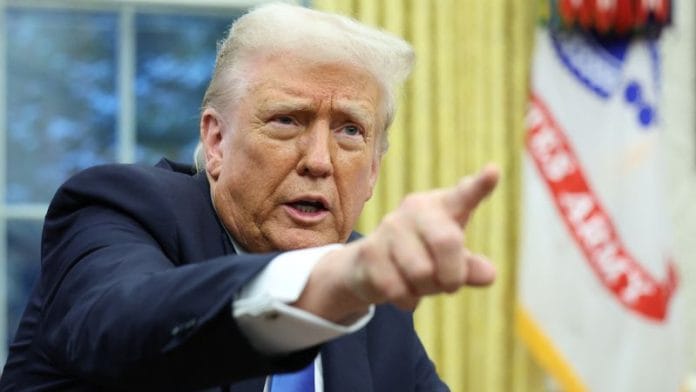New Delhi: US President Donald Trump repeated Thursday that BRICS nations could face 100 percent tariffs from the US “if they want to play games with the dollar”.
The warning came during his announcement on reciprocal tariffs, just hours before Trump’s scheduled meeting with Prime Minister Narendra Modi. India is one of the founding members of the bloc.
Trump repeatedly said “BRICS is dead”, and announced they would face steep tariffs on all US imports if they proceeded with launching a common currency.
“BRICS was put there for a bad purpose…I told them if they want to play games with the dollar, then they are going to be hit by a 100 percent tariff. The day they mention that they want to do it, they will come back and say ‘we beg you, beg you.’ BRICS is dead since I mentioned that…,” Trump said.
BRICS is an intergovernmental organisation made up of 10 countries—founded by Brazil, Russia, India and China in 2009, it expanded to include South Africa, Egypt, Ethiopia, Indonesia, Iran and the UAE.
In 2022, BRICS leaders discussed the creation of a new common currency that would be pegged partly to gold and partly to a basket of their own currencies. The idea behind it was to reduce reliance on the US dollar and the Euro. Predictably, the de-dollarisation plan has drawn sharp criticism from the US and other multilateral institutions.
Today, BRICS accounts for 46 percent of global GDP and 55 percent of the world’s population. If it decides to step away from the dollar, it would massively decrease the US’s financial dominance.
“BRICS is dead the minute I mentioned that if they mess with the dollar, they will get 100 percent tariffs,” Trump reiterated during his announcement. “BRICS is dead.”
Also read: US deportations are typical Trump theatrics, redrawing American borders with permanent markers
Trump’s challenge to BRICS
BRICS arose out of the need to be a geopolitical and geoeconomic counterweight to the West, as its founding countries believed international institutions were overwhelmingly dominated by Western powers.
Signalling a changing economic order driven by emerging economies like India, Russia, China, Brazil and South Africa, the first summit was held in 2009 on the heels of the global financial crisis. To the West, BRICS represents a growing geopolitical rivalry between the East and West, and a split between the Global North and South.
When asked Thursday if he wanted to dismantle BRICS or be a part of it, Trump said: “BRICS was put there for a bad purpose and most of those people don’t want it.”
He’d issued similar warnings before—most recently on 30 January, when he told BRICS countries to “Go find another sucker nation”. He had posted on Truth Social: “We are going to require a commitment from these seemingly hostile Countries that they will neither create a new BRICS Currency, nor back any other Currency to replace the mighty U.S. Dollar or, they will face 100% Tariffs, and should expect to say goodbye to selling into the wonderful U.S. Economy.”
“They can go find another sucker Nation. There is no chance that BRICS will replace the U.S. Dollar in International Trade, or anywhere else, and any Country that tries should say hello to Tariffs, and goodbye to America!”
Russia mooted BRIC currency
The call for de-dollarisation was first made by Russian President Vladimir Putin in 2023 at a BRICS summit, saying that member countries should “expand settlements in national currencies and enhance cooperation between banks”.
In June 2024, BRICS’ foreign ministers met in Russia and advocated for the “use of local currencies in bilateral and multilateral trades and financial transactions between the member countries”.
However, BRICS has struggled with a range of internal issues and has been unable to come up with a cohesive policy that benefits all member nations, despite steadily expanding over the past few years and inviting new members.
Though some analysts believe the bloc could undermine the Western-led world order, many skeptics say that creating its own currency and developing alternatives to existing multilateral institutions could face massive challenges.
(Edited by Tikli Basu)
Also read:






